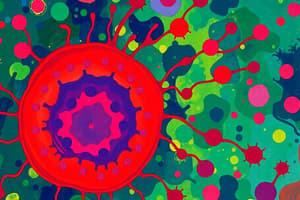Podcast
Questions and Answers
Which cells predominantly respond to the presence of Pseudomonas organisms during infection?
Which cells predominantly respond to the presence of Pseudomonas organisms during infection?
- Eosinophils
- Monocytes
- Lymphocytes
- Neutrophils (correct)
What is the first step in the process of phagocytosis?
What is the first step in the process of phagocytosis?
- Killing and degradation of the ingested material
- Fusion of the phagocytic vacuole with lysosomes
- Recognition and attachment of the particle to the leukocyte (correct)
- Engulfment and formation of a phagocytic vacuole
Which type of leukocyte is responsible for longer-term immune response and outlives neutrophils?
Which type of leukocyte is responsible for longer-term immune response and outlives neutrophils?
- Basophils
- Eosinophils
- Neutrophils
- Monocytes (correct)
What term describes the movement of leukocytes towards chemical signals during inflammation?
What term describes the movement of leukocytes towards chemical signals during inflammation?
What are the components of endogenous chemoattractants in the immune response?
What are the components of endogenous chemoattractants in the immune response?
What is the primary function of leukocytes during inflammation?
What is the primary function of leukocytes during inflammation?
Which step follows the margination of leukocytes during emigration?
Which step follows the margination of leukocytes during emigration?
How does a leukocyte typically migrate through the endothelium?
How does a leukocyte typically migrate through the endothelium?
What type of leukocyte is predominant during the first 6 to 24 hours of acute inflammation?
What type of leukocyte is predominant during the first 6 to 24 hours of acute inflammation?
Which mechanism primarily contributes to the permeability increase during acute inflammation?
Which mechanism primarily contributes to the permeability increase during acute inflammation?
What characterizes the difference between exudate and transudate?
What characterizes the difference between exudate and transudate?
What is the role of collagenases and elastases during leukocyte emigration?
What is the role of collagenases and elastases during leukocyte emigration?
What phenomenon describes leukocytes assuming a peripheral position along the endothelial surface during inflammation?
What phenomenon describes leukocytes assuming a peripheral position along the endothelial surface during inflammation?
What primarily causes the swelling associated with inflammation?
What primarily causes the swelling associated with inflammation?
Which type of inflammation is characterized by rapid onset and the predominant presence of neutrophils?
Which type of inflammation is characterized by rapid onset and the predominant presence of neutrophils?
Which of the following roles do neutrophils primarily fulfill during inflammation?
Which of the following roles do neutrophils primarily fulfill during inflammation?
What is a key difference between exudate and transudate?
What is a key difference between exudate and transudate?
Which of the following is NOT a participant in the inflammatory response?
Which of the following is NOT a participant in the inflammatory response?
What is the main consequence of inflammation if not regulated properly?
What is the main consequence of inflammation if not regulated properly?
What is the primary function of monocytes during inflammation?
What is the primary function of monocytes during inflammation?
What role do chemical mediators like prostaglandins and bradykinin play during inflammation?
What role do chemical mediators like prostaglandins and bradykinin play during inflammation?
Flashcards are hidden until you start studying
Study Notes
Leukocyte Function and Inflammation
- Inflammation serves to deliver leukocytes to injury sites and activate them for host defense.
- Leukocytes perform phagocytosis, clearing pathogens, necrotic tissue, and foreign substances.
- Activation of leukocytes can sometimes lead to tissue damage and prolonged inflammation.
Extravasation Process
- Defined as the movement of leukocytes from blood vessels to interstitial tissues.
- Involves multiple steps:
- Binding: Leukocytes attach to endothelial cells.
- Rolling: Leukocytes move slowly along the endothelium.
- Adhesion: Firm attachment to endothelial cells is established.
- Transmigration (diapedesis): Leukocytes squeeze through endothelial junctions into tissues.
Margination and Movement
- Blood flow slows during inflammation, causing leukocytes to migrate peripherally (margination).
- The endothelium becomes lined with leukocytes, known as "pavementing."
- Leukocytes traverse the basement membrane using enzymes such as collagenases and elastases.
Types of Leukocytes and Their Timeline
- Neutrophils dominate within the first 6 to 24 hours of acute inflammation; they are short-lived and undergo apoptosis.
- Monocytes appear after 24 to 48 hours and become macrophages, which outlive neutrophils.
- In some infections, special patterns of leukocyte dominance occur; for example, in viral infections, lymphocytes may be predominant.
Chemotaxis
- Describes leukocyte movement toward inflammatory sites in response to chemical signals (chemoattractants).
- Exogenous stimuli include bacterial products, while endogenous stimuli come from components of the complement system.
Phagocytosis Mechanism
- Involves recognition and attachment to particles, engulfment with vacuole formation, and degradation of the ingested material.
- Phagocytosis relies on binding of pathogens to receptors on leukocytes, fusion with lysosomes, and subsequent destruction of materials.
Cardinal Signs of Inflammation
- Redness: Caused by dilation of small blood vessels.
- Heat: Results from increased blood flow.
- Swelling: Due to edema from fluid accumulation in extravascular spaces.
- Pain: Mediated by substances like prostaglandins and bradykinin.
- Loss of function: Often secondary to pain.
Goals and Effects of Inflammation
- Aim to remove injurious agents and necrotic tissue.
- Limit tissue injury and strive to restore normal tissue function.
- Without inflammation, infections could proliferate, wounds wouldn’t heal, and organs would incur permanent damage.
Inflammation Participants
- Involves plasma proteins, blood vessels, various leukocytes (neutrophils, monocytes, etc.), connective tissue cells (macrophages, mast cells), and extracellular matrix components.
Types of Inflammation
- Acute Inflammation: Rapid onset, short duration, characterized by fluid exudation and leukocyte emigration (mostly neutrophils).
- Chronic Inflammation: Gradual onset, longer duration, simultaneous tissue injury, inflammation, and healing processes.
Studying That Suits You
Use AI to generate personalized quizzes and flashcards to suit your learning preferences.





